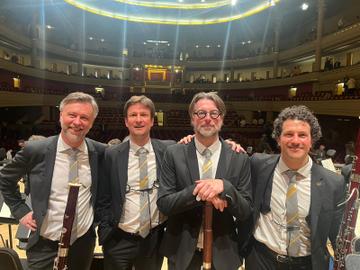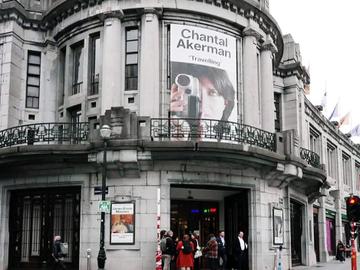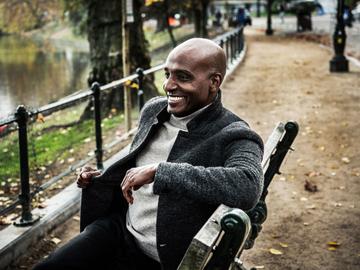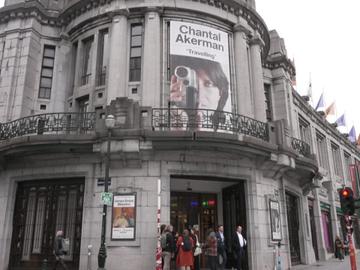Nobody is better than Mary Beard at showing how Classical Antiquity in fact is not ancient history at all. At Bozar, the world's most famous classicist will talk with the journalist Annelies Beck about her life and work, as well as the many links between the world of today and that of the old Greeks and Romans – with a focus on feminism and power.
© Polly Alderton-BBC-Lion Television
Also read: Studenten houden betoog op Difference Day: 'Wilde mijn gedacht zeggen over zaak-Sanda Dia'
“I wish I had had a teacher like Mary Beard!” says 'cosmin marius' in a comment under a YouTube video starring British classicist Mary Beard. How I agree, dear cosmin (or should I say marius?). It would have made my own time at secondary school a lot more fun, and I'm sure my Latin would be a lot less rusty than it is now.
Mary Beard has spent almost 40 years teaching classical antiquity at the renowned University of Cambridge in the UK. But she's not the kind of scholar that is content just to work in an ivory tower. Over the past decades, she has published numerous popular history books on the ancient world, presented a long list of TV documentaries and made countless media appearances. In 2018, she was knighted and can now call herself “Dame Mary” (but doesn't). In 2020, Ghent University (UGent) awarded her an honorary doctorate, and the talk at Bozar is part of the festivities around that – delayed by the pandemic.
“Mary Beard is brilliant at reaching a broader audience without selling her soul or stooping down too low,” says professor Lieve Van Hoof, one of the promoters of Beard's honorary doctorate at UGent and herself a classicist. “She uses insights about the classical civilizations to make us look at our current culture with different eyes and with proper attention to nuances.”
Mary Beard is brilliant at reaching a broader audience without selling her soul or stooping down too low. She uses insights about the classical civilizations to make us look at our current culture with different eyes and with proper attention to nuances
She has achieved those feats with bestsellers such as Pompeii, SPQR: A History of Ancient Rome and her latest book Twelve Caesars: Images of Power from the Ancient World to the Modern. She has presented several TV programmes such as the BBC documentaries Meet the Romans and Shock of the Nude. In the latter series, she gives her own take on our obsession with the nude in art, from ancient Greece to the present. All such eye-catching exploits turned her into a celebrity with a large fan base. One of her admirers, writer Megan Beech, even published a poetry book entitled When I Grow Up I Want to Be Mary Beard.
In the British Museum's blog, she brings up an anecdote about a visit to that same museum when she was just five years old which inspired Beard herself to become a classicist. She became fascinated by a small piece of ancient Egyptian cake or bread, thousands of years old, and was desperate to get a closer look. As her mother struggled to lift her up, a staff member offered to open the museum case instead.
“He took the cake out and held it right in front of my eyes. I've never forgotten the excitement of that first close encounter with the distant past,” writes Beard. “His message was clear – if you really wanted to explore the ancient world, there were people who would act as your guides. Whether literally or metaphorically, museum cases could be opened.”
TWITTER STORMS
Apart from being a kind of history guide, Beard is also very much a public figure, not shying away from speaking her mind about a broad array of societal topics. She shares many of her opinions on her popular blog for the Times Literary Supplement, “A Don's Life”, but is also very active on that most modern of arenas for civilised debate – and the scene of a fair bit of mud-slinging – called Twitter. As an opponent of Brexit, she famously got into a discussion with an important donor of pro-Brexit party UKIP – Arron Banks.
Beard reacted to a tweet of Banks in which he stated that the Roman empire had collapsed because of immigration, a historical misconception often used to fulminate against immigration. But what made their discussion famous, is that they actually continued it in real life, meeting face-to-face over lunch. “What also characterises her, is that she not only corrected Banks on the historical facts about the decline of the Roman empire, but she afterwards emphasised that their talk also provided her with new insights, about problems around the EU,” says Van Hoof. “She really wants to keep a dialogue with people with different ideas, so crucial in these polarised times.”
Unfortunately, not every online discussion ends in a civilised lunch meeting. Beard has certainly been in the eye of a few proper Twitter storms and has often been attacked vehemently by Internet trolls, to the point of receiving death threats. She in particular became the target of online harassment following a controversial piece she wrote for the London Review of Books in the weeks after the September 11, 2001 terrorist attacks. In that short article, she wrote about the feeling that “the United States had it coming” and that “world bullies, even if their heart is in the right place, will in the end pay the price.”
For the record, she later explained more carefully what she had meant, for example to the Los Angeles Review of Books: “I would say that it is a fair point to make that there is an interrelationship between Western policy – and that's not just the United States – and world terrorism.” She added that “part of the job of the academic is to be the gadfly. And sometimes that rebounds, and that's a part of it.”
Her relaxed style makes her stand out in the world of polished media personalities and elicits what she herself called “inappropriately hostile responses”
Much abuse directed at Beard is, however, not related to controversial statements, but is misogynistic in nature. Her relaxed style – long grey hair worn loose, hardly any make-up and casual clothing – makes her stand out in the world of polished media personalities and elicits what she herself euphemistically called “an 'inappropriately hostile' response” every time she speaks on radio or television.
SHUT UP, WOMAN!
She wrote at length about the topic in her book Women & Power: A Manifesto, published at the start of #MeToo in 2017 and described by The Guardian as “a modern feminist classic”. In the book, Beard shows how the public silencing of women goes back to the ancient times, pointing amongst others to a scene in Homer's Odyssey – written almost 3,000 years ago. In the scene, Odysseus' son Telemachus basically tells his mother to shut up as “speech will be the business of men”.
Although she will no doubt continue to let her voice be heard, Beard is at the end of this year retiring as professor at the University of Cambridge. As a 'retirement present', she will help fund two classics students from under-represented backgrounds as part of efforts to encourage more diversity among those studying the subject at the university.
“We've done a lot of work in saying that […] this isn't just for posh people who've done Latin for ages. But you still walk around the faculty and it looks – although not entirely – very white,” she stated in her characteristically frank manner in a press statement, in which she also expressed her gratitude for her long career at the university: “It's given me the opportunity to do lots of things – and it's paid my mortgage for 40 years!”
MEET THE WRITER: MARY BEARD
7/4, 20.00, Bozar, www.bozar.be
Read more about: Expo , Mary Beard , Bozar



